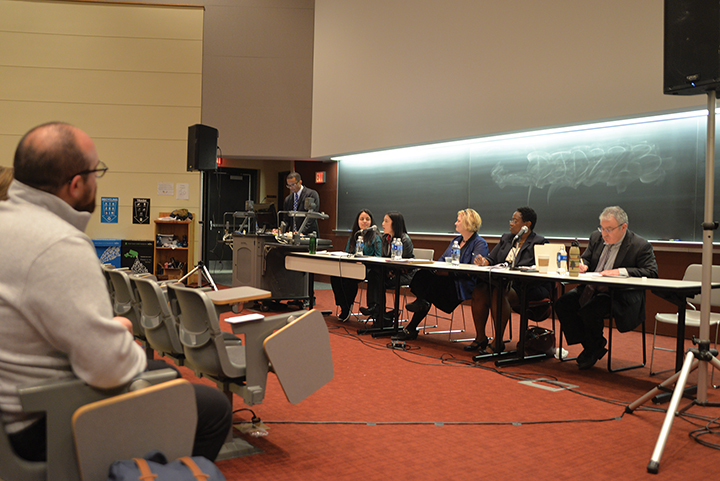With President Trump’s administration releasing a spate of initiatives and executive orders that have left many undocumented and international students uncertain of their futures, a five-member panel came together Wednesday to address how the University of Maryland is responding to these students’ concerns.
About 60 students and faculty attended the Stamp Student Union-sponsored event in the Biosciences Research Building to discuss university resources for undocumented and international students — such as incoming students still in need of visas — and how to help guide them through potential immigration changes. The panel also touched on how other students can lend a hand.
The panel featured Yvette Jones, the coordinator for Latinx student involvement and advocacy; Janelle Wong, the director of Asian American studies; Jody Bose, International Student and Scholar Services’ principal designated school officer; and immigration attorneys Patricia Minikon and Mark Shmueli.
Navigating the unique issues undocumented and international students face at this university “still remains a challenge,” Wong said. Trump released a new immigration ban Monday barring citizens from six Muslim-majority nations — which goes into effect March 16 — after federal judges put a stop on his original order, and the Department of Homeland Security on Feb. 21 announced expanded deportation efforts and enforcement of immigration laws.
“You place on top of that these new executive orders … [it] adds just another level of stress,” Bose said, adding that the university needs to ensure its students have access to updated information on any immigration enforcement changes.
Although the new travel ban does not bar students with visas, it does pose complications for newly admitted students slated to start at this university in the fall. The first time international students from the six affected countries could apply for a visa is June 14, which makes it unlikely that they will receive it in time for the fall semester. The International Student and Scholar Services office is working with these students to accommodate their likely delayed arrivals, Bose said.
ISSS staff has created resources on its website to keep students informed about how the executive orders could affect them, Bose said. It has also urged students to notify them if they are traveling so they can assist them if they run into trouble at airports or borders.
Until recently, there hasn’t been a concerted push to create a centralized information hub for undocumented students, Wong added, which can feel “alienating and disconcerting.”
Wong worked closely with Stamp’s Office of Multicultural Involvement & Community Advocacy to launch a website in December 2016 for undocumented students to connect with resources that could help them with any difficulties that arise. For example, getting a university identification number can be difficult for these students because it requires a Social Security number, but the website can provide contact information for people who can help them obtain a university ID.
Student groups such as Political Latinx United for Movement and Action in Society have also been helping pool resources for undocumented and international students. Last month, PLUMAS hosted a fundraising gala and raised more than $1,000 to provide undocumented students and their families with legal aid.
Despite current initiatives in place, Wong said this university still needs to do more work to educate staff about how to handle undocumented students’ concerns and to create more staff member positions dedicated to these issues.
Undocumented students may feel more pressure than the typical student “because they are navigating [this university] on their own, [and] also navigating the federal government and life circumstances for their entire family,” Jones said.
Likewise, international students often face language barriers while trying to adjust to a new area where they don’t have any family members, Bose said.
Undocumented students may also face significant financial burdens, Wong noted. Their parents may be working under difficult labor conditions, and one event, such as a car accident, health problem or deportation of a family member could put the student under a lot of “psychological stress.”
Students at this university covered under Deferred Action for Childhood Arrivals are protected from deportation, as Trump’s administration has decided to keep the program, which allows young immigrants who qualify to work and study in the U.S. for two-year periods. This university has 113 DACA students as of fall 2016.
Wong said this university’s biggest resource is “students’ voices,” adding that creating spaces for students to safely tell their stories “has made a tremendous difference.”
Jones said the event was a success because she saw many faces in the audience that she didn’t recognize.
“The information is getting out to new people,” Jones said. “Since the election we’ve seen an election an increase of people being motivated to be involved, which to me is really helpful, especially because there is a lot of work to do.”



